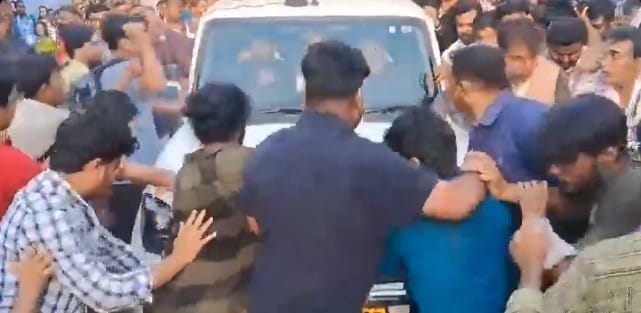Twenty years ago, at midnight on 10-11 June, police entered the Jadavpur University campus and lathi-charged students who were on a fast-unto-death. The police action led to a large segment of civil society joining the students in protest, not just on campus but beyond. This was June 2005, well before protests began in Singur in 2006, Nandigram in 2007, and Lalgarh in 2008.
Then, in November 2010, then chief minister Buddhadeb Bhattacharjee arrived at Jadavpur University (JU) to inaugurate something but ended up stuck in his car for three hours in the face of student protests. Six months later, he lost his chair.
The point of this concatenation of circumstances in the final decade of the Left Front regime is this: JU has played political bellwether in much of West Bengal’s contemporary political history. Chief Minister Mamata Banerjee, now racing toward her fourth bid for the high chair in the Assembly election just over a year away, would be well advised to remember that. And to take very, very seriously the horrific incident of 1 March, when her education minister Bratya Basu’s car hit a JU student on the university campus.
That student, Indranuj Roy, is in hospital with reportedly 14 stitches around his left eye. Last Saturday, he and his university mates were heckling and blocking the path of the visiting education minister to demand student union elections in JU, last held in 2020. Most other colleges and universities in the state have not had union elections since 2013. Mamata Banerjee suspended these elections in February that year after a policeman was shot dead outside a college during the filing of nominations.
If the storm of statewide student protests following the Bratya Basu incident is any yardstick, the demand for union elections is not limited to JU but extends across the state. The demands are that much louder because, in October, Mamata Banerjee promised to hold them in six months. Urging junior doctors to cease their protests against the rape and murder of their colleague at RG Kar hospital, Banerjee on 22 October had said she would ensure elections in educational institutions across the state were held in March 2025.
It is now March 2025, and there is no sign of any such election in sight.
Also Read: Blood, Bengal, and Breaking News—Local TV channels are desensitising us, badly
A campus gamble gone bad
Bratya Bose has at least personally spoken to Indranuj’s parents. But some young Turks in Trinamool Congress (TMC) are not helping the situation. The way they have tried to twist what seem to be the most obvious facts about the minister’s car hitting the student, spewed venom at Indranuj, and maligned him and his fellow students—unless you are a blind TMC bhakt, these attacks cannot go down well.
Not that the JU students are angels. Far from it. The horrific ragging incident of 2023 that led to the death of a 17-year-old student at the university’s hostel is grim testimony. And there is no reason to disbelieve what some avowed TMC supporters present at JU have told me—that the heckling of Bratya Bose by the students sometimes bordered on a manhandling threat.
But to allow a situation in which a student is injured by the minister’s car? Bratya Bose, a thespian, filmmaker, and former professor, should have known better. He could have nipped the problem in the bud by meeting the 3,000-odd members of the West Bengal College & University Professors Association (WBCUPA) at a different venue—anywhere but JU, which has kept its doors shut to TMC for the last 15 years.
By some counts, there are only three or four professors at JU who are pro-TMC. This same meeting could have been held in a myriad other colleges without a ripple. Choosing to hold it at JU was viewed by students and some faculty as pre-election provocation, a bid to flex muscle on a campus that has consistently said no to TMC. Threats by a senior TMC minister that he could order in his army of supporters and take over JU in one minute are so not done.
Also Read: Jadavpur University Press is a rare success in publishing. Now Ashoka is catching up too
JU’s rebel DNA
TMC, however, should not take JU’s indifference to its politics personally. When Mamata Banerjee sacked a VC in 2014, she was a campus rockstar. But in the 10 years since, JU has slipped back to its essential DNA of anti-establishment politics. It was so during many years of the Left regime. It has been so since the university was seeded back in 1906 as the National Council of Education (NCE), funded by anti-colonial revolutionaries and visionaries like Aurobindo Ghosh, Rash Behari Bose, Raja Subodh Mallik, and Rabindranath Tagore. Its primary objective: challenge British hegemony in education.
That spirit of the NCE, which became Jadavpur University by an Act of Parliament in 1955, of challenging the establishment may have metamorphosed over the decades, but probably still powers the slogans that bounce around the campus any time of day or night. Bhenge phalo barricade—or break down the barricades—has been a consistent favourite.
TMC’s efforts to corral the students of JU is a challenge best left to be attempted before the 2031 elections. Forcing the issue now could just needlessly jeopardise 2026.
A firm date for student union elections in the foreseeable future would be the best damage control.
Monideepa Banerjie is a senior journalist based in Kolkata. She tweets @Monideepa62. Views are personal.
(Edited by Asavari Singh)







Ms. Monideepa Banerjie is always worried that her “sister”, Ms. Mamata Banerjee, might lose power in Bengal. However, she does not mind if the Left dethrones the TMC.
However, the very thought of the BJP defeating Mamata Banerjee is a nightmare for her.